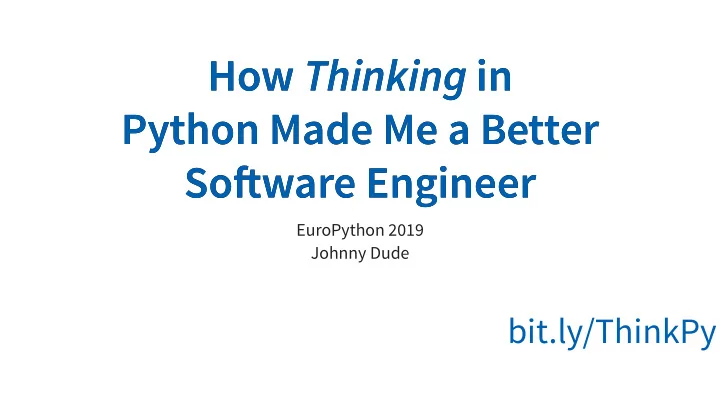

void f(Object obj) // pass by value void f(Object& obj) // pass by reference void f(Object* obj) // pass by raw pointer void f(Object&& obj) // pass by rvalue void f(shared_ptr<Object> obj) // pass by shared pointer void f(unique_ptr<Object> obj) // pass by unique pointer void f(shared_ptr<Object> or unique_ptr<Object> obj) // ?? void f(const Object* obj) // object is immutable void f(Object* const obj) // pointer is immutable void f(const Object* const obj) // both are immutable void f(Object const* obj) // what is immutable?
void f ( shared_ptr < Object >& obj ) // pass shared pointer // by reference void f(Object obj) // pass by value void f(Object& obj) // pass by reference void f(Object* obj) // pass by raw pointer void f(Object&& obj) // pass by rvalue void f(shared_ptr<Object> obj) // pass by shared pointer void f(unique_ptr<Object> obj) // pass by unique pointer void f(shared_ptr<Object> or unique_ptr<Object> obj) // ?? void f(const Object* obj) // object is immutable void f(Object* const obj) // pointer is immutable void f(const Object* const obj) // both are immutable void f(Object const* obj) // what is immutable?
We can use shared pointers everywhere But, we cannot stop thinking about...
Type Hints Type Hints
Do we realy want to define types and structures before understanding the problem and the solution?
Constantly task switching between: Coding and Type-defining
How many bits would I like this integer to have?
What happens when you are wrong?
Lets just use int, and deal with it later.
Prototyping Prototyping
Prototype is a model built to test a concept, and to be learned from
You write it once, gaining experience in both understanding the problem, and understanding a solution
You write it again, with less things to worry about and attention to finer details
Improved Readability Improved Maintainability Fewer Bugs
Coding Prototyping Coding
Coding Future Tasks Prototyping Coding Future Tasks
Some things you can do only in Python
Use a dictionary Define a function
Think in the language you write
Handle type checking, seperately
Along with many other reasons.
c++ Coding Future Tasks Python c++ Coding Future Tasks Prototyping An empirical comparison of c, c++, java, perl, python, ...
How much of the speedup do we get from thinking faster?
My Experiment My Experiment
+--+--+--+--+--+--+--+--+--+ +--+--+--+--+--+--+--+--+--+ |S | |Sooooooooooooooooooo | + +--+--+--+--+ + +--+ + + +--+--+--+--+ + o+--+ + | | | | | | | | | | ooo | | +--+ + + + +--+--+ + + +--+ + + + +--+--+o + + | | | | | | | | | | oooooo | | + +--+ +--+--+ +--+--+ + + +--+ +--+--+ o+--+--+ + | | | | | | | | | oooo| | +--+ +--+--+ +--+ + +--+ +--+ +--+--+ o+--+ +--+--+ | | | | | | ooo | | + +--+ +--+--+ +--+--+ + + +--+ +--+--+o +--+--+ + | |E | | |E | +--+--+--+--+--+--+--+--+--+ +--+--+--+--+--+--+--+--+--+
1 # Python 2 # c++ 3 # Python 4 # Python 5 # c++
1 # Python 42 2 # c++ 3 151 # Python 22 4 # Python 14 5 # c++ 30 Work Time in Minutes
#1 74 Python 42 108 #2 c++ 151 #3 54 Python 22 #4 50 Python 14 #5 64 c++ 30 Work Time in Minutes Source Lines of Code Excluding: comment, empty lines, bracelets
#4 50 Python 14 #5 64 c++ 30 Work Time in Minutes Source Lines of Code Excluding: comment, empty lines, bracelets
Both version have exactly the same Algorithm 50 Data Types 14 Funtions 64 Names 30 Work Time in Minutes Source Lines of Code Excluding: comment, empty lines, bracelets
Both version have exactly the same Algorithm 50 Data Types 14 Funtions 64 Names 30 28 excluding extra time for typing Work Time in Minutes Source Lines of Code Excluding: comment, empty lines, bracelets
set<Point> calc_path(map<Point, Point> prevs, Point point) { set<Point> results; point = prevs[point]; while (prevs.find(point) != prevs.end()) { results.insert(point); point = prevs[point]; } return results; } auto points = calc_path(prevs, end_point); def calc_path(prevs, point): point = prevs[point] while point in prevs: yield point point = prevs[point] points = set(calc_path(prevs, end_point))
Why? Why?
What was I Thinking About?
Experiment, Experiment, it's fun it's fun
#1 74 Python 42 108 #2 c++ 151 #3 54 Python 22 #4 50 Python 14 #5 64 c++ 30 Work Time in Minutes Source Lines of Code Excluding: comment, empty lines, bracelets
Summary Summary Immediate Feedback Standard Representation & API Composability Prototype in Python
Summary Summary Immediate Feedback Standard Representation & API Composability Prototype in Python
Summary Summary Immediate Feedback Standard Representation & API Composability Prototype in Python
Recommend
More recommend